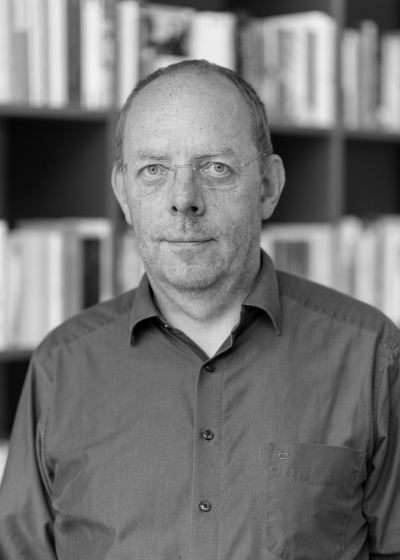Bernhard Purin
© Daniel Schvarcz
Regarding the unexpected passing of our colleague and friend Bernhard Purin
Orbituary
Born and raised in Bregenz, Vorarlberg, Bernhard Purin’s interest in Jewish history was sparked early on by his history teacher Meinrad Pichler. Even as a student, he roamed the then-desolate former Jewish quarter of the nearby town of Hohenems with his camera. After studying empirical cultural studies and modern history in Tübingen, he worked as project manager in 1990 and 1991 on the establishment of the Jewish Museum Hohenems and published his first book, which was about the history of the neighboring community of Sulz: The Jews of Sulz. A Jewish rural community in Vorarlberg 1676-1744.
Already in the founding phase of the Hohenems museum, he proved to be a contentious figure who encountered the often naive handling of objects of material Jewish tradition with knowledge and critical enthusiasm, insisting on precise object research. In addition, he also laid the foundation for the development of the museum’s genealogical research database. Thus, the museum is still characterized by his critical mind and his sense of networking.
Between 1992 and 1995, Bernhard Purin was curator at the newly founded Jewish Museum Vienna. Here, he initiated the Vienna Yearbook for Jewish History, Culture & Museum Studies, which he also edited as the main responsible person. With his contribution Jewish History and Culture in Austrian Museums and Exhibitions in the first volume of this yearbook, he laid an essential foundation for the expansion of a comprehensive bibliography on the subject of Jewish historiography, cultural history, contemporary history, and art in museums. During a research stay at the Central Archives for the History of the Jewish People, he found the inventory book of the world’s first Jewish Museum, which allowed for the gradual reconstruction of the Vienna pre-war collection. With the exhibition Confiscated. The Collection of the Vienna Jewish Museum after 1938, the processing of the history and fate of the historical Jewish Museum in Vienna began in 1995.
1995, he was appointed as the director of the Jewish Museum Franken in Fürth, where his ironic approaches to Jewish history and present triggered some productive controversies – debates that he could endure with the support of the professional community, the museum’s sponsors, as well as the approval of the interested audience. In 2002, he was appointed as the founding director of the Jewish Museum Munich, which he could open in 2007 – and of which he remained the director until the end. Under Bernhard Purin’s leadership, Munich was a place of innovative exhibition contents and design over the years, as well as a sought-after project partner. One of his culturally most original exhibitions certainly was Beer is the Wine of this Country. Jewish Brewing Stories in 2016/17. Principally, it was one of his strengths to always keep in mind the thematic and content-related connection to the place of his work. In the Bavarian capital, he was also significantly involved in the development of the memorial site for the victims of the Olympic massacre, which opened in 2017. In 2022, together with his team and in collaboration with a number of other Munich and Bavarian institutions, he coordinated a twelve-month remembrance project “Twelve Months – Twelve Names”, which commemorated one of the people murdered in 1972 each month.
Bernhard Purin was globally esteemed as an expert in Judaica and was in constant exchange with collectors. His love for Jewish ritual objects was expressed not only in such large object-based exhibitions as, for example, Seven Boxes of Jewish Material. From Theft to Rediscovery 1938 to Today’ in 2018 but also in many smaller presentations such as Sign and Metal Art by Heinrich Schwed. Judaica from a Munich Artisan Workshop in 2009 or Samson’s Menorah – A Hanukkah Menorah from the Wertheimer Family Collection in 2014, as well as in numerous thoroughly researched individual publications.
He also greatly influenced the international networking of Jewish museums. From 2001 to 2007 and from 2013 to 2018, he served on the board of the Association of European Jewish Museums (AEJM). At the same time, he was always willing to share his knowledge, be it in the training programs of the AEJM, in the scientific advisory boards of various museums, the Editorial Board of the journal Images. A Journal of Jewish Art, the Advisory Board of the Central Registry of Information on Looted Cultural Property, or in personal conversation.
Everyone who knew Bernhard Purin is stunned by the fact that he is no longer with us. His unerring judgment and humor, his integrity, his profound knowledge, and his unusual and surprising approaches to the world of Jewish object history will be sorely missed.
Jutta Fleckenstein (Jüdisches Museum München), Felicitas Heimann-Jelinek and Michaela Feurstein-Prasser (xhibit.at), Hanno Loewy (Jüdisches Museum Hohenems), Mirjam Zadoff (NS-Dokumentationszentrum München)
